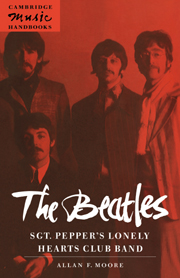Legacy
Published online by Cambridge University Press: 25 November 2009
Summary
‘Its enormous success was to have unfortunate consequences in succeeding years, when some truly awful “concept” albums in the style of Pepper got taken very seriously indeed by people who should have known better.’ Sgt. Pepper was the high point of a cumulative process which changed the nature of the game that was Anglophone popular music. As I have already suggested, the major available positions in the preceding few years can be summarized in terms of ‘pop’ (represented, perhaps, by Herman's Hermits or, now, the Monkees) and ‘rock’ (represented by the Rolling Stones and, subsequently, by Cream or Jimi Hendrix) with the Beatles, despite their rock ‘n’ roll credentials and the rollicking vocals of which McCartney was capable, tending towards the former. At the time, Sgt. Pepper seemed to mark rock music's coming of age, an issue I shall return to at the close of this chapter. Now, of course, with jaded memories, we think of it as ushering in an era of pomposity, with varying degrees of seriousness, to which punk rock formed the inevitable antidote. The case was not clear at the time, for although the entire pop/rock edifice was adding storeys at a remarkable rate, 1967 still supported a very strong ‘established’ popular music market in the UK, catered to by Engelbert Humperdinck (who prevented ‘Penny Lane’/‘Strawberry Fields’ from reaching No. 1), Petula Clark, Ken Dodd and the like.
- Type
- Chapter
- Information
- The Beatles: Sgt. Pepper's Lonely Hearts Club Band , pp. 70 - 82Publisher: Cambridge University PressPrint publication year: 1997



